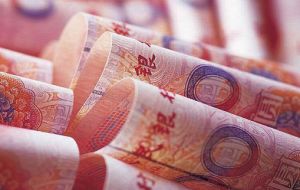MercoPress. South Atlantic News Agency
G20: Beijing tailors generic final declaration with no specific mention to China's problems
 Despite concerns about China’s Yuan policy since the August devaluation, the statement had only generic reference to refraining from competitive devaluations.
Despite concerns about China’s Yuan policy since the August devaluation, the statement had only generic reference to refraining from competitive devaluations. China pulled off a defensive win at the Shanghai Group of 20 (G20) meeting of global finance leaders after months of angst abroad over its economic and policy direction. For starters, there was no specific concern over China in the communiqué released late Saturday.
G20 said “growth in key emerging market economies remains strong”. Though concerns about China’s Yuan policy have roiled markets repeatedly since an August devaluation, the statement had only generic reference to refraining from competitive devaluations.
China won support for its goals for the G20 meeting, such as examining broader use of the International Monetary Fund’s (IMF) reserve-currency unit — to which the Yuan will be added this year. A green finance study group has also been established after strong backing from China, which is looking for ways to clean up its polluted rivers and smoggy skies.
However Chinese diplomacy was at its best following calls around the world for China to improve communication on its policies and intentions. United States Treasury Secretary Jacob J Lew said China communicated its policies well at the two-day gathering. And Asian stocks rallied when, hours before the first G20 session, central bank governor Zhou Xiaochuan highlighted scope for further actions if needed, and co-host Lou Jiwei flagged additional fiscal firepower is on the way.
The communiqué embrace of structural reforms, infrastructure investment and acknowledgment of the limitations of monetary stimulus reflected the host nation’s own views. Premier Li Keqiang said quantitative easing policies cannot remove structural obstacles to growth and may lead to negative spillovers. The focus of G20 members should remain on structural reforms, he said.
In other words, China is doing exactly what the IMF and OECD (Organization for Economic Co-operation and Development) wishes higher-income countries would do.”
As with other G20 members, implementation of China’s commitments could be thorny. Fiscal stimulus plans will run up against the headwind of constricted finances among local Chinese authorities. And reforms confront vested interests in keeping China’s behemoth, indebted state-owned enterprises away from restructuring.
The next test for China’s leaders comes when they gather in Beijing for their annual National People’s Congress, starting March 5. Officials are anticipated to unveil a growth target of a range of 6.5 to 7% for 2016, and discuss plans to cut overcapacity and boost labor mobility. At the G20, Chinese policymakers were reassuring, and the mood of the gathering was “serene”, said Pierre Moscovici, European Commission head of economic and financial affairs.
The G20’s tasking of a study group to identify institutional and market barriers to green finance matched the interest of Chinese officials, including central bank research department chief economist Ma Jun, who has championed improved funding of environmentally sustainable technologies and projects.
The group will also be charged with developing options on mobilizing private capital for green investment. “The issue has always needed a more solid platform for discussion,” said Lu Zhengwei, chief economist at Industrial Bank in Shanghai. “It’s a breakthrough that they can include this topic when China is hosting the G20.”




Top Comments
Disclaimer & comment rules-

-

-

Read all commentsIgnoring China's problems doesn't make them go away.
Feb 29th, 2016 - 10:31 am 0Its not illegal in China to report financial figures unless Party approved.
Feb 29th, 2016 - 11:58 am 0The Party has stopped providing many of their Economic Stats
China will collapse shortly.
Funny how just a few short years ago people were talking about it taking over the USA.
Most people are fools.
We are allies of BRICS. If one suffers, all suffer. If one is in trouble, all is well.
Feb 29th, 2016 - 12:06 pm 0Nothing in this world will cause us to come to approach the Evil Empire again.
United States does not exist for us!
Commenting for this story is now closed.
If you have a Facebook account, become a fan and comment on our Facebook Page!